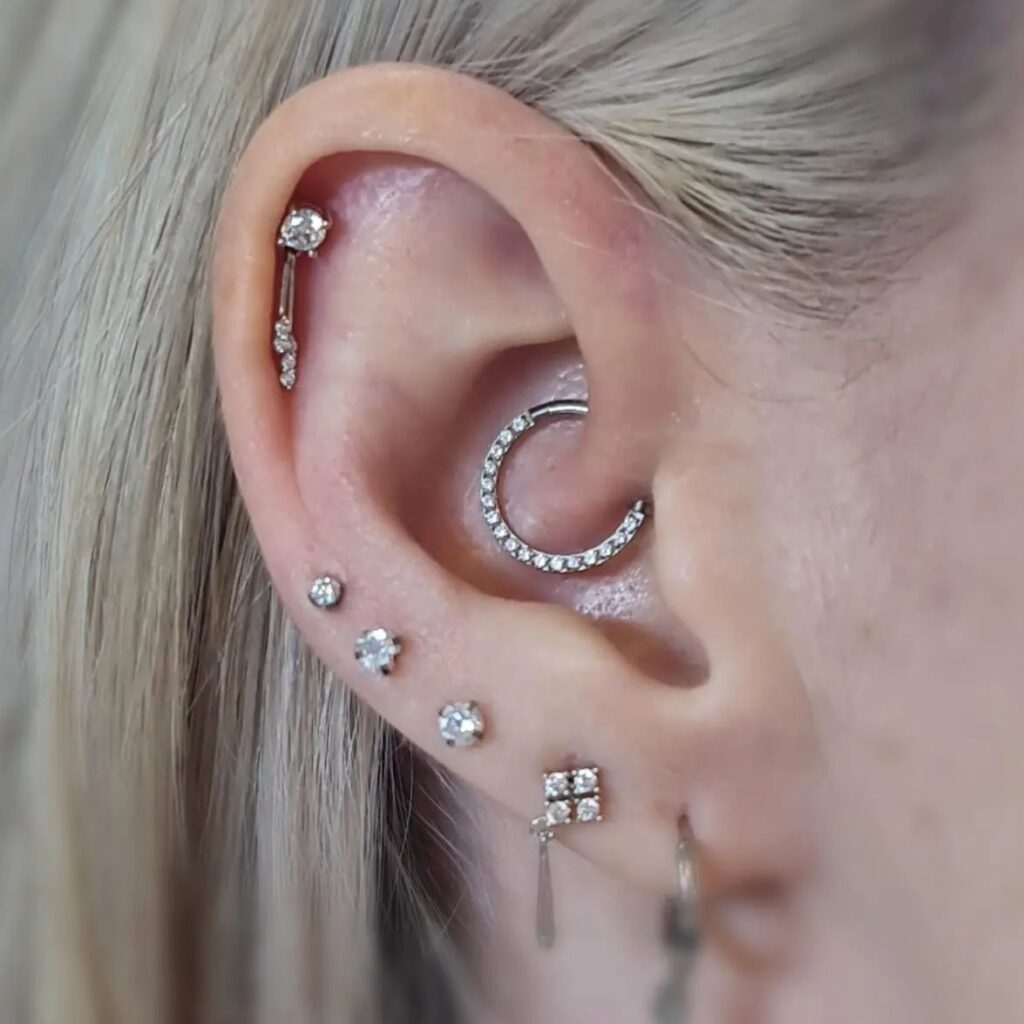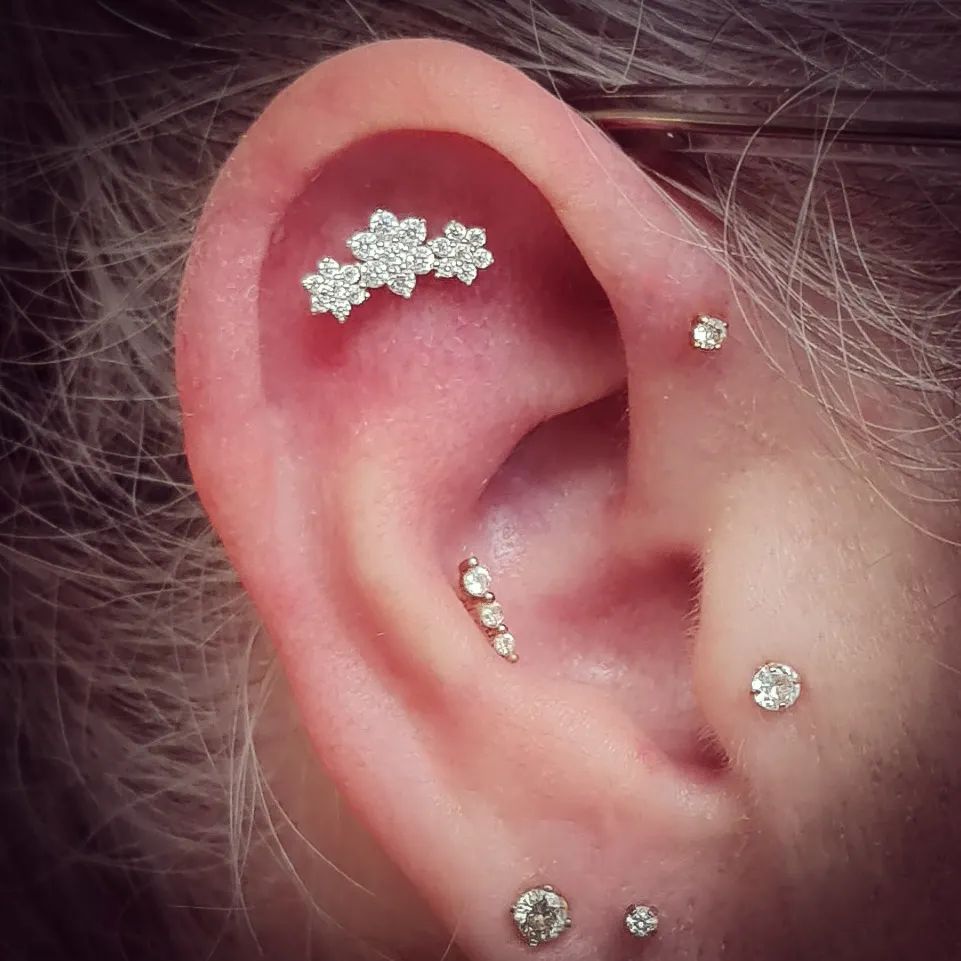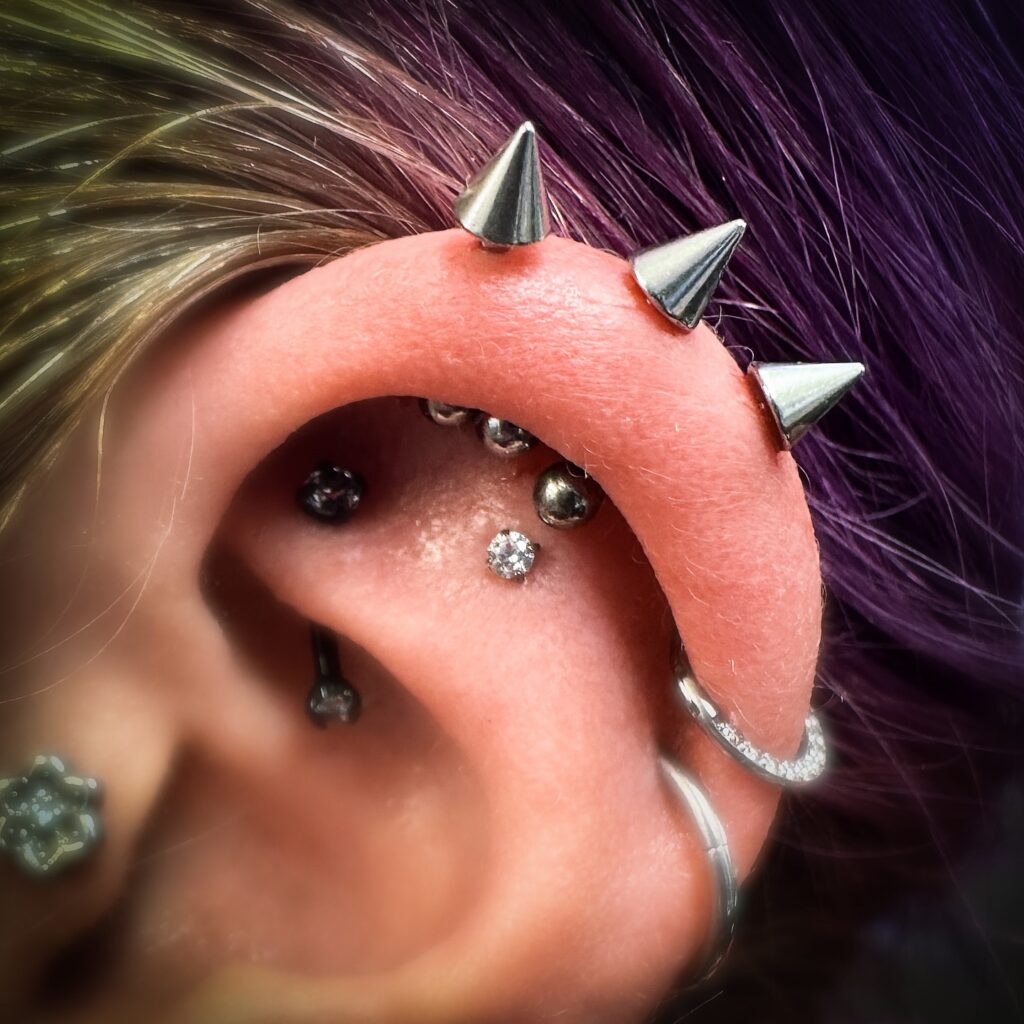Comprehensive Ear Piercing Guide
Lobe: The lobe is the lower section of the ear, which is one of the most common piercings. Shop Lobe Jewellery
Helix: The helix is positioned in the upper outer cartilage of the ear. Shop Helix Jewellery
Forward Helix: The forward helix is placed on the curve on the inner portion of the ear. Shop Helix Jewellery
Rook: The Rook is located in the cartilage of the upper ear. The rook piercing is performed in a vertical manner, allowing the rings and curved balls to face outward. Shop Rook Jewellery
Daith: The daith is located within the inner fold above the ear canal. This is located between the rook and tragus, placed where the outer ridge of your ear meets your inner ear. Daith piercings usually are forward facing, so that the stones are clearly visible. Shop Daith Jewellery
Tragus: The tragus is positioned on the inner cartilage area, which is located in the sector of the triangular flap. It is above the lobe and is the harder section of the ear on the side of your face. Shop Tragus Jewellery
Antitragus: The antitragus is in the outer cartilage area, and is the triangular flap above the lobe, opposite to the tragus piercing. Shop Antitragus Jewellery
Conch: The conch is located in the middle section of the ear. A Labret bar or a Hoop could be worn. Shop Conch Jewellery
Ear Piercing Healing Guide
Ear piercing healing times can vary significantly depending on the location of the piercing. For example, earlobe piercings typically heal within 6-8 weeks, while cartilage piercings, such as the helix or tragus, may take anywhere from 3-6 months or even longer to fully heal. It is important to follow the aftercare advice provided by your piercer during this time to avoid complications. Sticking to a consistent aftercare routine—like cleaning with a saline solution, avoiding unnecessary touching, and refraining from changing jewelry too soon—is crucial for preventing infections, irritation, or delayed healing. Ignoring aftercare guidelines can result in painful complications, such as swelling, prolonged redness, or even the development of unsightly scar tissue. Following professional advice ensures your piercing heals properly, looks its best, and reduces the risk of any long-term problems.
1. Immediate Aftercare (First 24-48 hours)
- Avoid touching the piercing: Only touch the piercing with clean hands.
- Keep the piercing clean: Use a saline solution to gently clean the piercing site.
- Avoid sleeping on the piercing: Try to sleep on your back or opposite side to prevent irritation.
- Avoid submerging in water: Refrain from swimming in pools, hot tubs, or oceans.
2. Short-Term Aftercare (First 2-4 weeks)
- Clean with saline solution: Use a sterile saline solution or a piercing aftercare spray twice daily. Apply the solution with a clean gauze pad or cotton ball.
- Avoid using alcohol or hydrogen peroxide: These can dry out the skin and delay healing.
- Avoid rotating the jewelry: Let the piercing heal naturally without twisting or turning the jewelry.
- Avoid beauty products: Keep hair products, lotions, and makeup away from the piercing area.
- Monitor for signs of infection: Redness, swelling, heat, and discharge are normal for the first few days, but if these symptoms persist or worsen, consult a professional.
3. Mid-Term Aftercare (4-8 weeks)
- Continue cleaning twice daily: Stick to a routine with a saline solution or a gentle, fragrance-free cleanser.
- Avoid changing jewelry: Do not change your piercing jewelry until it is fully healed (usually 8-12 weeks for earlobe piercings, longer for cartilage).
- Protect from trauma: Be cautious of hats, headphones, or any clothing that might snag or irritate the piercing.
4. Long-Term Aftercare (8 weeks and beyond)
- Reduce cleaning frequency: After the initial 8 weeks, you can reduce cleaning to once a day.
- Check jewelry tightness: Occasionally check that the jewelry is secure but avoid over-tightening.
- Watch for delayed healing signs: Even after initial healing, the piercing can still be prone to irritation or infection if not cared for properly.
- Transition to hypoallergenic jewelry: If you experience irritation, consider switching to hypoallergenic materials like titanium or 14k gold.
Aftercare Solutions and Products
- Saline Solution:
- Use a pre-made sterile saline solution or create your own by mixing 1/4 teaspoon of non-iodized sea salt with 1 cup of warm distilled water.
- Saline helps to cleanse the piercing without harsh chemicals.
- Piercing Aftercare Spray:
- Available at most piercing shops or pharmacies, these sprays are designed to clean and soothe without harsh additives.
- Non-Fragrance Antibacterial Soap:
- Use a mild, fragrance-free antibacterial soap if recommended by your piercer. Gently lather around the piercing and rinse thoroughly with water.
- Chamomile Compress:
- If experiencing minor irritation or swelling, a chamomile tea bag compress can soothe the area. Soak a chamomile tea bag in hot water, let it cool to a comfortable temperature, and place it over the piercing for 5-10 minutes.
Things to Avoid During Healing
- Swimming in pools, hot tubs, or the ocean: Bacteria in water can cause infections.
- Using alcohol or peroxide: These products can dry out and irritate the skin.
- Touching or twisting the jewelry: Can introduce bacteria and cause irritation.
- Applying ointments or creams: These can block airflow to the piercing, slowing down the healing process.
Signs of a Healing Piercing vs. Signs of Infection
Normal Healing Signs:
- Minor swelling and redness
- Occasional light bleeding
- Clear or pale yellow discharge (lymph fluid)
Signs of Infection:
- Persistent redness and swelling
- Intense pain or throbbing
- Thick, green or yellow discharge with an odor
- Fever or chills (seek medical attention immediately)
When to See a Professional
- If you notice any signs of infection that do not improve with proper care, or if the jewelry becomes embedded in the skin.
- For advice on jewelry changes or if you're experiencing prolonged discomfort.
Conclusion
Proper aftercare is essential for the healing process of your new ear piercing. Following these guidelines will help ensure your piercing heals smoothly and remains healthy. Always consult with your piercer if you have any questions or concerns regarding your piercing care routine.
Popular Ear Jewellery
Testimonials
Our Happy Clients
"Jess is so lovely and so awesome at piercing. Hygiene is top notch as is her expertise. She has done three piercings on my daughter now and after trying somewhere closer to home once we will never stray again. Worth every cent!"
Rachael Wolfgram
"Absolutely the place to go, the 2 most honest and helpful people ever, both have the customers best interest at heart. I love the banter and friendliness as soon as you enter. Thank you so much for taking care of my piercings and changing them out for more stunning titanium pieces. I’ll be back!!"
Tash
"Jess pierced my navel today and man was she amazing. I’ve gone to her three times for piercings and she never disappoints. I have always felt so welcome and safe in Body Modifications, as they create such a pleasant, calm environment. highly recommend to anyone in or out of the area. can’t wait to go back 🤭"
Katy Taylor
"So recommend! 😍 Jess is so efficient and thorough!! Ive had a couple piercings done here and i’ve never had any issues with any of them. My questions always get answered and Jess pretty much relieves my anxiety every time! loveeee coming here & will definitely be back!!"
Sarah Malu
"Jess did my first belly piercing today and did an excellent job whilst ensuring i was calm throughout the process. She has a very high level of professionalism and manners. Would deffinately reccommend."
Aretha
"Awesome piercing done by Jess, just what I wanted and placed accordingly. I was informed about after care and how long it takes my piercing to heal. A good experience!"
Sarah










